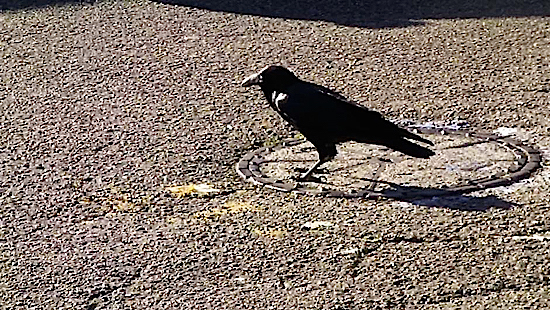Search
Recent comments
- a peace deal....
9 hours 43 min ago - peace now!
11 hours 9 min ago - a nasty romance....
11 hours 14 min ago - blackmail?.....
13 hours 45 min ago - ukraine's agony has not started yet....
1 day 7 hours ago - all defeated.....
1 day 7 hours ago - beyond crime.....
1 day 8 hours ago - the end....
1 day 8 hours ago - odessa....
1 day 9 hours ago - weitz....
1 day 11 hours ago
Democracy Links
Member's Off-site Blogs
more intelligent than me and my computer — and trump....

Humans have tended to believe that we are the only species to possess certain traits, behaviors, or abilities, especially with regard to cognition.
Occasionally, we extend such traits to primates or other mammals—species with which we share fundamental brain similarities. Over time, more and more of these supposed pillars of human exceptionalism have fallen. Nieder et al. now argue that the relationship between consciousness and a standard cerebral cortex is another fallen pillar (see the Perspective by Herculano-Houzel). Specifically, carrion crows show a neuronal response in the palliative end brain during the performance of a task that correlates with their perception of a stimulus. Such activity might be a broad marker for consciousness.
Abstract
Subjective experiences that can be consciously accessed and reported are associated with the cerebral cortex. Whether sensory consciousness can also arise from differently organized brains that lack a layered cerebral cortex, such as the bird brain, remains unknown. We show that single-neuron responses in the pallial endbrain of crows performing a visual detection task correlate with the birds’ perception about stimulus presence or absence and argue that this is an empirical marker of avian consciousness. Neuronal activity follows a temporal two-stage process in which the first activity component mainly reflects physical stimulus intensity, whereas the later component predicts the crows’ perceptual reports. These results suggest that the neural foundations that allow sensory consciousness arose either before the emergence of mammals or independently in at least the avian lineage and do not necessarily require a cerebral cortex.
Read more:
Science 25 Sep 2020:
Vol. 369, Issue 6511, pp. 1626-1629
My smart arse computer misnamed the picture at top... It tries to be ahead of me all the time and added letters to the word "crow"... Idiot...
See also:
- By Gus Leonisky at 29 Sep 2020 - 4:51pm
- Gus Leonisky's blog
- Login or register to post comments
bird brains debate...
After months of trading long-range barbs during the 2020 US election campaign, President Donald Trump and Democratic nominee Joe Biden will meet face-to-face on the debate stage on Wednesday.
It's the first of three presidential debates between the two candidates before the US election on November 3.
Here are five quick questions to bring you up to speed.
1. When is the first presidential debate? And other important bits to know
The first debate will be held on Wednesday, September 30 from 11:00am — 12:30pm AEST.
The venue is the Case Western Reserve University in Cleveland. The original venue was the University of Notre Dame, but the university withdrew because of the coronavirus pandemic.
The moderator will be Fox News host Chris Wallace.
It'll be divided into six 15-minute segments, chosen by Wallace:
The questions on each topic are a closely guarded secret, and each candidate will get two minutes each to respond.
Don't leave your seat: The debate won't have any commercial breaks. Once it starts, it doesn't stop till it's over.
Read more:
https://www.abc.net.au/news/2020-09-29/donald-trump-joe-biden-first-presidential-debate-us-election/12696528
Sample answers before questions are asked:
TRUMP: It's fake news...
BIDEN: I apologise for the Iraq war... and for the other one....
insults fly...
As the Trumpmola/Bidenmania debate turned into a punch up, On the Glenn Back show, the host lamented the lack of journalists around that could make sense of this. But as we all know (we all should), birds that talk love to say profanities...
Staff had hoped the birds would drop their bad habits once they went outside. But chief executive Steve Nichols said that didn’t go to plan, mostly because the parrots “swear to trigger reaction or a response” – and laughing or shocked visitors just encourage more colourful language.
“With the five, one would swear and another would laugh and that would carry on,” he told the BBC.
“Some visitors found it funny but with kids visiting at weekends, we decided to move them.
“I’m hoping they learn different words within colonies – but if they teach the others bad language and I end up with 250 swearing birds, I don’t know what we’ll do.”
The park has some experience with birds causing a stir. Earlier in 2020, another resident – Chico the parrot – went viral on social media with his version of Beyonce’s If I Were a Boy. He now has his own Instagram page.
Read more:
https://thenewdaily.com.au/news/world/uk-news/2020/09/30/african-grey-parrots-swear/
Read from top.